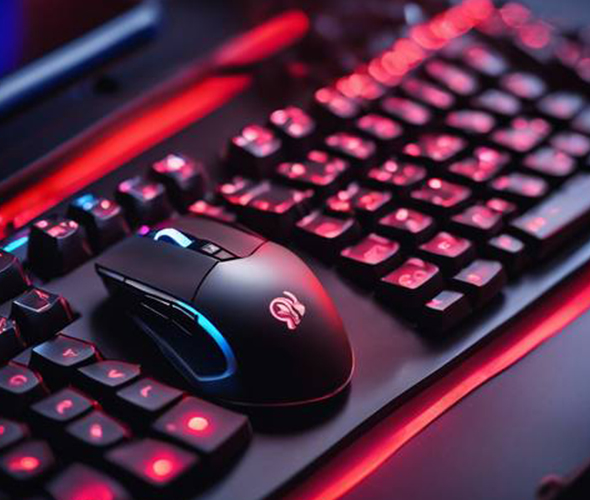Understanding Your Gaming Needs
When selecting gaming peripherals, one of the crucial aspects to consider is your individual gaming style and preferences. Different genres of games call for distinct characteristics in mice, keyboards, and headsets. For instance, first-person shooters (FPS) demand a mouse that offers high sensitivity and rapid responsiveness, while real-time strategy (RTS) games may require a keyboard equipped with programmable keys for efficient macros. On the other hand, role-playing games (RPGs) often prioritize comfort and durability, given that players may engage in extended periods of gameplay.
Customizability is another vital feature to analyze. Many gamers appreciate peripherals that allow for personalized settings, such as adjustable DPI settings on a mouse or customizable key functions on a keyboard. This way, you can tailor your equipment to better suit your gaming habits, enabling quicker reactions and improved accuracy in gameplay. Furthermore, consider a headset that supports surround sound to enhance your immersive experience, particularly in competitive gaming.
Ergonomics should not be overlooked either. Longevity in gaming sessions may lead to discomfort or strain if the peripherals do not align well with your physical setup. An ergonomic mouse can reduce wrist fatigue, while a keyboard designed with an appropriate hand position can enhance your overall experience. Pay attention to the weight and size of the mouse, the key travel distance on the keyboard, and the fit of the headset; these factors will significantly impact comfort and performance during intense gaming sessions.
Ultimately, understanding your gaming needs allows you to make informed decisions regarding the peripherals that will enhance your overall gaming experience. By assessing your preferred game genres, comfort requirements, and customization desires, you can effectively choose products that not only meet your expectations but also elevate your gaming performance.
Choosing the Right Gaming Mouse
When selecting a gaming mouse, various features must be carefully assessed to enhance overall gaming performance. One of the most critical specifications to consider is the DPI (dots per inch) setting, which determines the mouse’s sensitivity. A higher DPI allows for faster cursor movement, suitable for fast-paced games, while lower DPI offers more precision for tasks that require accuracy, such as in strategy games. Many gamers benefit from a gaming mouse that allows for adjustable DPI settings, giving them the versatility to switch between different gaming scenarios.
Another vital aspect of a gaming mouse is its polling rate, which refers to how often the mouse reports its position to the computer. A higher polling rate, ideally at least 1000 Hz, ensures that movements of the mouse are registered more smoothly, providing a more responsive gaming experience. Alongside these technical specifications, it is also essential to consider the type of sensor used in the mouse. Optical sensors are often preferred for their accuracy and reliability on various surfaces, whereas laser sensors can function on more diverse surfaces but may exhibit acceleration issues in some scenarios.
Ergonomic design plays a significant role in comfort during extended gaming sessions. A well-designed gaming mouse should fit comfortably in the user’s hand, preventing strain. Factors like weight and grip style—whether palm, claw, or fingertip—can substantially impact usability. Heavier mice can provide stability, while lighter ones offer maneuverability. Additionally, users should consider whether they prefer wired or wireless options. While wired mice often provide stable connections with minimal latency, wireless mice have improved significantly and offer greater freedom of movement. For various gaming styles and budgets, it is advisable to test different mice to find the best fit, ensuring an optimized gaming experience.
Selecting the Ideal Gaming Keyboard
Choosing the right keyboard is a paramount decision for gamers, as it can significantly influence gameplay and overall experience. Gaming keyboards generally fall into two categories: mechanical and membrane. Mechanical keyboards utilize individual mechanical switches beneath each key, providing distinct tactile feedback and audible click sounds. This responsiveness allows for quicker actuation, making them particularly favorable for fast-paced gaming. Various mechanical switch types, such as Cherry MX, Razer, and Romer-G, offer different actuation forces and tactile responses, catering to both casual and competitive gamers.
Membrane keyboards, on the other hand, feature a pressure pad system that registers keystrokes when they are pressed down. While often quieter and more budget-friendly, they may lack the precision and durability associated with their mechanical counterparts. Understanding these fundamental differences is crucial as it determines the user’s typing and gaming experience.
Beyond switch types, gamers should also consider the keyboard layout. Full-size keyboards include all keys, including a numeric keypad, while tenkeyless options forego the numeric section, offering a more compact design that’s easier to maneuver in tight gaming environments. Additionally, features such as anti-ghosting ensure that multiple key presses are registered simultaneously, which is essential for complex gaming maneuvers. Macros also allow users to program specific key sequences, enhancing gameplay efficiency.
RGB lighting is another popular feature that can improve immersion and aesthetics but may not directly influence performance. When selecting a keyboard, it is important to prioritize features based on personal gaming styles—strategic players may benefit from macro support, while fast-paced gamers may prefer tactile feedback for quick actions. Ultimately, testing different keyboard types and layouts plays a vital role in finding the perfect gaming keyboard suited for individual needs.
Finding the Best Gaming Headset
Selecting the perfect gaming headset can greatly enhance the immersive experience for both casual and competitive gamers. One of the primary considerations when evaluating gaming headsets is sound quality. A headset that delivers clear, crisp audio can provide critical advantages in gameplay, allowing players to detect subtle sounds such as footsteps or environmental cues. Look for headsets equipped with high-quality drivers that produce a broad frequency range to ensure an engaging audio experience.
An equally important feature is the microphone capabilities. A good gaming headset should possess a microphone that captures voice clearly while minimizing background noise. For competitive gaming, having a microphone with noise-cancellation technology is essential, as it ensures that in-game communications remain clear, which can often be the deciding factor in team-based scenarios. Some headsets even offer detachable or flexible microphones, allowing gamers to customize their gear based on their preferences.
Comfort should not be overlooked when choosing a gaming headset. Gamers often spend extended hours in gameplay sessions, necessitating a headset with adjustable padding for the ear cups and headbands. Lightweight designs can also enhance comfort, preventing fatigue during prolonged wear. Additionally, consider the ear cup material; breathable fabrics typically provide greater comfort compared to synthetic leather, especially in warmer environments.
The choice between wired and wireless headsets also plays a significant role in the overall gaming experience. Wired headsets usually offer lower latency and sometimes better sound quality, while wireless headsets provide greater freedom of movement but may encounter additional latency issues. Be sure to check battery life specifications for wireless models to ensure they can support long gaming sessions without interruption.
Lastly, when selecting a gaming headset, it is advantageous to ensure compatibility with other gaming peripherals and setups. Headsets that connect via USB often provide a broader range of functionalities, including customizable sound settings, while traditional 3.5mm connection headsets remain universally versatile. By considering these critical aspects, gamers can find a headset that complements their gaming lifestyle and provides an optimal gaming experience.


No responses yet